Rainer Höß expresses outrage at TV shows of Nazi acts, but in practice he is a cold-tempered crook who uses his name to cheat people • Now, for the first time, his older brother talks about his actions: „My brother is the punishment from God on our family for not repenting“
June 24, 2020, Courtroom in Leonberg, a town near Stuttgart. 11:30 p.m. The opening of the hearing in a fraud lawsuit for the disappearance of 17,000 Euros (about 70,000 shekels), filed by Peter Rüsch – one of the heirs of the German shoe store empire „Salamander“ – against Hans-Rainer Hess, the youngest grandson of Rudolf Höß, the commander of the Auschwitz death camp. The accused is more known under his second name – Rainer.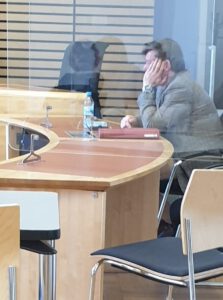 „What is your profession?“ the judge asks the accused.
„What is your profession?“ the judge asks the accused.
„Author,“ he says. This is a lie: Although a book was published about him, „The Commander’s Legacy,“ which includes his false version of his life, he did not write it.
„How do you earn your living?“ the judge asks.
„From school lectures,“ he replies. „I teach National Socialism.
Now, because of the plague, I am giving lectures on Zoom and Skype. Right now I have no income. I can live off savings for just for a few more months. I have debts of 200,000 Euros, most of which I inherited from my mother. ‚
In Germany the accused can lie in court. Unlike witnesses, he did not swear to tell the truth. And 55-year-old Rainer Höß takes full advantage of the freedom of lying he has been given. Sometimes to try to arouse pity, because he has no livelihood and income (he of course does not mention the huge amounts he took from many people through fraud and deception), or because of a seemingly unsettled health condition. Sometimes he does it to lay the blame for his crimes on his victims.
At the first hearing scheduled for May, he did not bother to appear at all. This time he was brought to court by the police. Rüsch is a fairly typical victim for Höß: a wealthy 80-year-old man who was quickly captivated by Höß‘s grandson stories on his family’s past and his „work“ against Neo-Nazis.
They first met in 2017 at an event with mutual friends at a local restaurant. Höß told Rüsch, that he produced and directed a film called „The Grandson“ for a Serbian public television station, a film which about his relationship with Eva Mozes-Kor, one of the Mengele twins (Mozes-Kor, who recently passed away, adopted him symbolically as a grandson after he had convinced her that his family didn’t want any connection with him). He claimed to possess properties in the USA, „millions worth”, which was temporarily not available to him, and that he urgently needs a loan to complete the work on the film and distribute it worldwide. Höß promised Rüsch, that he would repay the loan „within weeks”- through the “expected profits he will make from the film”.
Rainer Höß presented documents to the court, which allegedly confirmed his part in the production of the film. The film does exist, but it belongs to the Serbian documentary filmmaker Aleksander Reljic, who also received an award for it at the “Aljazeera Balkans” 2018 Documentary Film Festival. Reljic, like other filmmakers in which Höß participated – including the Israeli „Hitler’s Children“ – preferred to turn a blind eye to incriminating information about Reiner Höß‘ very problematic character in order to create a false idyll of reconciliation between descendants of Nazi criminals and Jews.
Each such film gave Rainer Höß another opportunity to expand his fraud network, in which people around the world, including Holocaust survivors, fell. Only a few had the courage to bring the criminal to justice for his deeds; Victims generally preferred to save themselves from the shame of exposing the fact that they were trapped in a crook’s net, moreover with a „family pedigree“ like Höß’s.
All the stories about Höß scam activities, which I heard over years from people who contacted me, had a joint thread: the grandson of the Auschwitz commander said, he needed a loan to finish a movie or book, a deal he was just working on or a foundation he was creating for the “memory of the Shoah”; He has „personal property estimated in millions“, which is stuck in a bank account or in a foreign country and will allow him at a later stage to repay the loan. In most cases he presented forged documents, which corroborated his fabric stories, and then he
disappeared with the money.
In the corner of the courtroom in Leonberg, in the part allotted to a very limited audience, Kai Höss (58), Rainer’s older brother, sat buried in his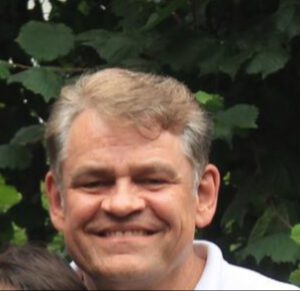 thoughts. Every lie that came out of his brother’s mouth made the big man smaller, as if he wanted to vanish. When the judge read, before sentencing, his brother’s previous list of criminal convictions, Kai had a hard time hiding the shock: 13 convictions for fraud, threats and violence, since 1991, including a year and a half in Jail. The previous time he was convicted was in 2016 for three years probation.
thoughts. Every lie that came out of his brother’s mouth made the big man smaller, as if he wanted to vanish. When the judge read, before sentencing, his brother’s previous list of criminal convictions, Kai had a hard time hiding the shock: 13 convictions for fraud, threats and violence, since 1991, including a year and a half in Jail. The previous time he was convicted was in 2016 for three years probation.
„I would have preferred to send the defendant to jail,“ the judge said, „but the law allows me to impose on him only eight months probation and 80 hours of public work.“ If his other victims had filed lawsuits against him, he would have been in jail long ago. But who wants to mess with the grandson of the Auschwitz commander, who was interviewed on CNN by Christiane Amanpour on the 70th anniversary of the liberation of Auschwitz, who often appears on German television shows, „adopted“ by one of the Mengele twins, who participated in the Swedish Social Democratic Party’s election campaign against The far right, who appears on the front pages of reputable newspapers in a revealing photo against the background of the extermination camp, with a suffering look and a tattoo on his chest that includes numbers (ostensibly of Auschwitz inmates), a Star of David and the slogan „Never forget.“
On one of the days of April 2018, a short anonymous message was left on my answering machine. When I called back, the person identified himself briefly: „I am Kai, Rainer’s brother.“ I knew immediately who it was. For years I tried to trace the older brother of Rainer Höß, who now heads an evangelical Christian community in Stuttgart, to help me uncover his brother’s many lies. Kai, like many of Rudolf Höß‘ family members, preferred to avoid any public appearance and lead his life quietly and detached from the terrible family history.
I was the first to publicly expose Rainer. In 2009, he approached Yad Vashem and offered to sell it his grandfather’s personal belongings. Before I published the story about this scandal, I called him to find out if he understood how disrespectful his offer was. I suggested to meet him to see his grandfather’s belongings, which included mostly idyllic family photos of the life the family had at the Villa Höß, next to the wall of the extermination camp.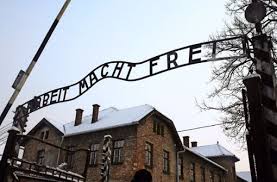 At that meeting it became clear to me that Rainer had never been to Auschwitz. I suggested him a joint trip, the impressions of which I published at the time extensively in Israel and Germany. The grandson then said all the „right“ things about his grandfather, but I had a strong gut feeling that he was not honest. I wrote then that his insistence on visiting the Villa Höß and the way he treated the villa seemed very puzzling to me, as if he had come to Auschwitz just to find out details on a family real estate property.
At that meeting it became clear to me that Rainer had never been to Auschwitz. I suggested him a joint trip, the impressions of which I published at the time extensively in Israel and Germany. The grandson then said all the „right“ things about his grandfather, but I had a strong gut feeling that he was not honest. I wrote then that his insistence on visiting the Villa Höß and the way he treated the villa seemed very puzzling to me, as if he had come to Auschwitz just to find out details on a family real estate property.
The publicity about the joint trip had aroused international interest. The trip was staged again in the film „Hitler’s Children“, which premiered in Israel on the Holocaust Memorial Day 2011. At the time, information began already to accumulate that Rainer was using the exposure to generate publicity and personal fortune, and that he had a serious criminal record, which he hid. Suddenly he even denied that he had tried to sell his grandfather’s belongings to Yad Vashem.
I published the details I learned about the man, and each publication led other people to contact me and tell me about their entanglements with Höß, whose activities took on a criminal character. These publications did not prevent Rainer from becoming a media star: journalists, film directors, film festivals, publishers, political parties, schools, cultural centers, Holocaust survivors – all gave him a stage and publicity, thus legitimizing his crimes.
Kai also contacted me following the articles I had published years earlier, which he found after learning from members of his religious community about the „tour“ his brother was conducting in the United States with Holocaust survivor Ben Lesser, and after he himself became a victim of his brother: Rainer hospitalized their mother (who died in December 2017) in a nursing home, after selling her home, pocketed all her money and emptied all her bank accounts. „Everything you wrote about him is true, and even worse,“ he admitted in the same phone call.
We met a few weeks later. I tried to persuade him to be interviewed, to expose the whole truth about his brother in a way that would make it possible to stop his acts of deception and cheat. Kai was hesitating. Mainly because feared, his brother will attack him and his family. The interview was conducted two years later, after the trial in Leonberg. Kai Underwood that he must engage himself in the effort to prevent his brother from trapping more victims.
Rudolf Höß commanded the Auschwitz-Birkenau camp from July 1940 to December 1943, and again from May 1944 until the January 1945. He was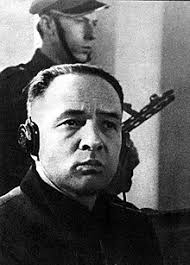 responsible for the industrial murder committed there and the deaths of millions of Jews. At the end of the war he managed to escape and hid on a farm near the Danish border, under the name of Franz Lang. He was captured in March 1946 by the British military police. Shortly afterwards he was handed over to Poland. He was hanged on April 16, 1947, in the square in front of the entrance to the crematorium of the Auschwitz concentration camp.
responsible for the industrial murder committed there and the deaths of millions of Jews. At the end of the war he managed to escape and hid on a farm near the Danish border, under the name of Franz Lang. He was captured in March 1946 by the British military police. Shortly afterwards he was handed over to Poland. He was hanged on April 16, 1947, in the square in front of the entrance to the crematorium of the Auschwitz concentration camp.
His wife Hedwig appeared briefly as a witness at the Auschwitz trials in Frankfurt in the mid-1960s, after which her traces disappeared. She died in 1989 at the age of 81.
Rudolph and Hedwig Hess had five children:
Klaus, the eldest, was born in 1930, and apparently died in the 1970s in Australia, from excessive alcohol consumption;
Heidetraud was born in 1932 and died of cancer in Germany a few years ago;
Inge-Brigitt was born in 1933, and after the war emigrated to Spain, where she worked in fashion, among others as a model. She married an American and moved to the United States, where she worked in a Jewish fashion store. She currently lives in Washington and is also ill with cancer;
Hans-Jürgen, the father of Kai and Rainer, was born in 1937 in the concentration camp of Dachau, where his father served. He lives alone in a resort town in northern Germany;
Annegret, the youngest daughter, was born in 1943 in Auschwitz and lives in Fulda, Germany.
Kai Höss lives in a modest house on the outskirts of Stuttgart with his second wife, Rahma, a native of the Philippines, who he met in Indonesia, and their four children. „This interview is not meant to be revenge on my brother,“ he clarifies as we meet, „I just want him to stop cheating over the names and ashes of millions of Holocaust victims. I read the things you wrote in 2011, and I had a pang of conscience. It’s important for me that he will be put in a corner that forces him to stop doing these things. ‚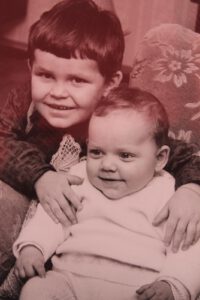 Kai was born in February 1962 in Walheim, a town not far from Stuttgart, in one of the wine regions of southern Germany. His mother, Irena Pauli-Höß, was from a wealthy rural family in the area. „She was the most dynamic figure in the family, emotional, hot-tempered. She felt very sorry for herself, because as a child she had dreams to study, but was not allowed to go to high school. She voluntarily joined the ranks of the Nazi ‚Bund deutscher Mädel” Union. As a mother, she was aggressive, very brutal and used to beat us.
Kai was born in February 1962 in Walheim, a town not far from Stuttgart, in one of the wine regions of southern Germany. His mother, Irena Pauli-Höß, was from a wealthy rural family in the area. „She was the most dynamic figure in the family, emotional, hot-tempered. She felt very sorry for herself, because as a child she had dreams to study, but was not allowed to go to high school. She voluntarily joined the ranks of the Nazi ‚Bund deutscher Mädel” Union. As a mother, she was aggressive, very brutal and used to beat us.
„My father was passive. Today he is 82. I called him a few days ago and asked to talk to him about the old times. He sent me a text message, in which he wrote: ‚No one can claim that I am a nationalist or a Nazi (as Rainer did). My father did terrible things. For me they are horrible. He paid the price for it.“
„It was my mother, who always spoke about the Nazi period with some forgiveness and said that those years were not so terrible”, continues Kai, “but the family did not glorify fascism and did not treat Nazism positively. My mother referred more to the status of the Germans at that time, to the building of highways. As a child I heard her say that after World War I everything was ruined, and under Hitler the Germans lived better. She did not try to deny the Holocaust. In fact, I did not hear any conversations about the Holocaust at home”.
„When I was older my mother told us, she first found out, who my grandfather was very late, following an article she read in a newspaper. She said, only then did she ask my father if he was Rudolf Höß‘ son, and he confirmed it. My father says something completely different: from the beginning of his relationship with my mother, he put all the cards on the table.“
How did your father become a member of “Jehovah’s Witnesses“, who were also persecuted by the Nazis?
„Until his second divorce he was anti-Christian and claimed, the church was a bad thing, full of hypocrisy. Then a group of ‚Jehovah’s Witnesses‘ came to his house and started talking to him. He told them he did not believe in the church, and they said, ‚Neither do we.‘ At that moment the bond was formed. He listened to them and received love from them. It was a rescue for him. After he joined them, the whole family severed the bond with him. My aunt Annegret and her family are devout Catholics, and they expelled him from the family.“
What memories do you have of your grandmother Hedwig?
„She was a very quiet and very correct woman, who kept order and appearance, but a very gentle woman. She acted like a real lady. It always annoyed my mother. When she came to visit us, my mother always had to bother, clean and cook.
„After the war she lived alone for a few years in Ludwigsburg, then moved to Fulda to live with her young daughter, Annegret. I do not think she changed her attitude to the Nazi era. When you are at the top of such a regime and enjoy a good life and power, you do not change”.
Kai does not keep in touch with his relatives. „My aunt Brigitte from Washington asked me a few days ago to contact her,“ he says, „I do not know what she wanted, but I have avoided contact with the family throughout the years.“
When did you first hear about your grandfather’s actions?
„As a child I heard talk in the family, that he was a Nazi criminal, that he was hanged for his crimes, that he was a horrible person. But there were always attempts by my mother’s family to embellish reality, to explain that once he entered the Nazi system, he had no way out. He fulfilled orders. When he asked to be sent from Auschwitz to fight on the front, he was not allowed to, because they wanted him to continue working in Auschwitz. „
And do you believe that?
„In life there is always a choice. He could have sAid: that’s that. Enough. But he was not a believer. It was about his life and his survival, and when he did not get what he wanted, he continued with what he did. I think he was an unscrupulous person. There are many more stories about him, that he abused the power he had.
„Grandma said that at the end of the war Heinrich Himmler told all his people, who had blood on their hands, that they should vanish among the simple German soldiers and. She also said that he was betrayed by his father-in-law, her father, who told British intelligence where he was. (according to another version it was Grandma Hedwig who betrayed her husband, as she did not forgive him for betraying her in Auschwitz with an inmate from Austria; E.B.).
„We were always told that he was a bad person and a big criminal. It was always clear in the family. No one denied it and did not try to clear his name. In fact, my mother’s family tried to present the Nazi period quite positively. My father did not.
„About 25 years ago someone told me about the book my grandfather wrote in prison after the war, ‚Commander in Auschwitz.‘ I was then almost 30. I began to discover my faith in religion and I wanted to know what he did. I knew he was a criminal, but after reading the book, I was shocked“.
The family was treated differently by German society because of your grandfather?
„My father told me very briefly that after the war children at school used to spit on him. At the end of the war they lived in northern Germany, and he suffered at school. He was only 7 years old when they left Auschwitz and had nothing to do with what was done there. But when the connection with his family became known, they attacked him. „
Did he say anything about Auschwitz?
„No. Only that Uncle Heini (Heinrich Himmler) came to visit and brought the box in which my grandfather’s personal belongings were stored (the box decorated with the Nazi symbols was one of three that Himmler gave to some of his associates and one of the objects Rainer wanted to sell Yad Vashem; E.B.).
How was the relationship between you and your brother when you were kids?
„I loved him, I defended him, and as a big brother I also manipulated him. Even today I love him, despite what he does. He has changed a lot. I am not a psychologist, but I think my parents‘ divorce was a serious break for him, and then he went on a crooked life path.
„It was a terrible divorce, it was all about money. My mother had money from her family, and my father made terrible investments with the money. He always had business ideas. He bought a fur business when furs went into fashion, and failed. Then they bought Time Share apartments in Tenerife, which brought no money.
„He always had big losses. He did work hard, but my mother lost her dignity in the eyes of the family every time again. She was accused of wasting all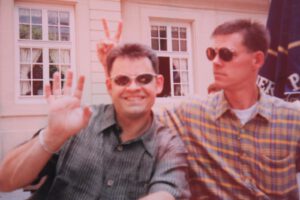 the family money in vain. They got a lot, and everything was gone.
the family money in vain. They got a lot, and everything was gone.
„I lived abroad then, because I wanted to get away from the family and build a life of my own. Rainer was in Germany and experienced everything. My mother continued to chase after my father seven years after the divorce. She broke the windows of his house, destroyed his car. When she had outbreaks of anger, she was very violent. She had a letter opener in her bag, and she stabbed my father in the back. The police came and issued a restraining order against her.
„Then my father made sure that he could not be found. I myself did not know where he was. They accused me of not making contact, but I did not want to contact this curse. I believe that because there was no remorse in the family for what was done in the Holocaust, this is God’s way of punishing us. One tragedy after another, ruined life.“
Have you had connections with other Nazi families?
„To the best of my knowledge no. I did not know anyone. Rainer had Neo-Nazi friends in the 1980s and 1990s. My mother told me about it. Here, in the Black Forest area, the Nazi scene is very active. But I do not think he was ideologically connected to them. It was a circle of friends. „
Rainer and your mother told me that after the divorce from your father she had a relationship with the son of Hitler’s personal doctor, Theodore Morel.
„I know she was in a relationship with a man by that name. I do not know if he was the son of Hitler’s doctor. In any case, he did not boast about it. He had a wine shop in Stuttgart. To the best of my knowledge, the relationship between them was only sexual. I saw him twice, when I came to visit from England. He seemed to me strange”.
Have you ever visited Auschwitz?
„No. I want to visit it once. It’s a place where a lot of bad things happened. I´ve got feelings for those who suffered and died there. I mourn for these people and for what happened there.“
I tell Kai, that during my visit to Auschwitz with his brother Rainer, the brother became completely obsessed with the Villa Höß. He claimed it belonged to him and wanted to set up a museum in his grandfather’s memory, where Rudolf Höß would be depicted as a “human being”. Kai found it hard to believe his ears.
One of the lies Rainer tells, to present himself as a victim of family history, is the story that he left home after finding out who his grandfather was. In fact, in this and other stories he scattered everywhere, he adopts the story of his older brother’s life.
Kai left home at the age of 18, enlisted in the German army and was assigned to NATO forces in Wales. During his service there he met his first wife, Corina, and returned with her to Germany. He studied hotel management at the expense of the state in Berlin, but did not complete his studies.
„I lived a completely fucked up life,“ he says, „I ruined my relationship with my wife. I really wanted a good marriage, which my parents did not have, but it did not work out. I worked a lot at night, at a disco, trying to make a good living and meet the financial demands of a woman who was a flight 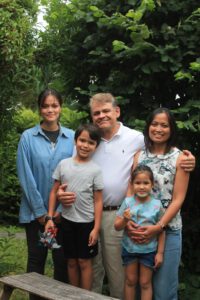 attendant on an airline. Then, in 1983, I moved to the UK, where I studied cookery and did an internship in management.
attendant on an airline. Then, in 1983, I moved to the UK, where I studied cookery and did an internship in management.
„In 1985 I went to Asia and found a job at the Lisboa Casino Hotel in Macau. I lived there for two and a half years, then moved to the Mandarin Hotel in Singapore as Deputy Director of the Food and Beverage Department. From there I moved to the Shangri-La Hotel in Bangkok. One day the pastor said to me, „This city is not good for you. You need to find a wife. Write a list of exactly what you want in a wife, and God will give it to you.“
„I made the list, and in 1993 I knew Rahma. I found 90 percent of what I needed, not what I wanted. From Bali we moved to Singapore, Sumatra, Shanghai, Cairo and Dubai. Everywhere I worked in hotel management positions. I was hardly in touch with my mother and Brother, except for one time they came to visit me in Singapore. ‚
Rainer, who after his parents‘ divorce was sent to boarding school, never studied any profession. He was unemployed, divorced his wife, and began getting money from people fraudulently. „During his visit to me, he was very impressed with my lifestyle,“ Kai recalled. „I made a lot of money then, I had a condo with a pool and a tennis court, 100 meters from the beach.
„After the visit, he started calling me and asking for money for all kinds of business ventures. My mother always pushed me to support his ‚export-import business.‘
„In 1996, he asked me for $ 100,000 to set up hotels in Asia. He said he had obtained gold from Ferdinand Marcus, the former dictator of the Philippines, and as soon as he got his hands on the gold, he would return the money to me. The gold, he said, stored in diplomatic suitcases, worth $ 150 million. Mother gave him 70,000 Marks (35,000 Euros) as a loan, ‚until he had access to Marcus‘ gold.‘ I refused to pay. Mother was very angry, saying that because of me he lost a great deal. Of course everything was a lie”
In Asia, Kai discovered Christianity, and when he returned to Germany with his family he was one of the founders of the Evangelical community in Stuttgart, which he now runs. He introduced his brother to the community, had him baptised, and helped him find housing and work, away from his mother.
‚I wanted to influence him in a positive way, to keep him away from what he did. But when I saw his lies, we fought and he moved away. I think my mother was jealous that I was trying to protect him and that he was not around her. She had a black, evil soul. For many years he was financially dependent on her. I showed him that he could get rid of her. She acted to separate us, and then she would call me to complain when he cheated on her and took money from her.
„Once he demanded money from her, but she was already in financial difficulties. He threatened her and pinned a knife to her neck. The neighbors heard the quarrel and called the police. He was arrested, but mother did not file a complaint against him.“
When did you first hear about his illegal issues?
‚When he was prosecuted for fraud, in Düsseldorf in 2002. His landlord called me and told me that Rainer had not paid rent for 13 months and had stolen electricity from the neighbors. He said an arrest warrant was issued against him for fraud and the police came looking for him”.
„I called Rainer and told him to report to the police immediately. He replied: ‚Everything is a lie.‘ I took him to the police. They immediately tied him up and brought him before a judge to set restrictive conditions until trial, as they feared he would escape. He had to report to police every Saturday.
„The trial was supposed to take place in Düsseldorf. I bought him a train ticket, gave him money and put him on the train. Then he called me and said he fell asleep on the train and missed Düsseldorf. At that time I still believed him. He asked me to call the judge and say good words about him.
„I called the judge, I explained that we were taking care of him, that he had many problems but now he is on the right track, and that I am taking care of him as the big brother. She listened to me. Then I tried to locate him by phone, and finally he answered and happily informed me that the legal proceedings against him were canceled. He took advantage of me. At one point, after catching him with more lies, he told me, „Leave me alone, I do not want to talk to you anymore. Talk only to my lawyer.“ All that, even though I helped him. „
Kai reveals in an interview that his mother wanted to hand him over Rudolf Höß‘ personal belongings, which Rainer wanted to sell to Yad Vashem. ‚After the divorce my mother tried to take everything from my father she thought was valuable. Himmler’s box with the belongings and photographs was in her house, she had no ideological interest in it. She wanted to get rid of it, and Rainer wanted to make money. He claimed that a lot of money could be made from it, millions. That in the United States there were people who would pay a lot of money for it.
„She asked my advice. I told her, ‚Do you want to make money from this? From these bloody items? Give it as a gift to a museum, get rid of it.‘ Eventually, she agreed to transfer the exhibits to a German historical research institute in Munich, to ban him from selling them. She offered to give me the power of attorney for the objects, and I refused. I heard about his attempt to sell it to Yad Vashem from my aunt in Washington, who called me and asked, ‚What is the little one doing? Are you reading the news? It’s all over the world. It’s awful.“ .
How do you feel when you hear how he deceives people in your family’s stories?
„I’m ashamed. That’s why I contacted you. He sells himself as an expert on the history of that period. This is utter nonsense. My father is so angry at what he is doing. He denies him as his son. He told me on the phone: ‚This is not my son.‘ He is angry with him because Rainer is lying and cheating on people. „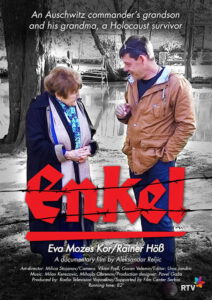 How did you feel when you heard that Eva Mozes-Kor had adopted him?
How did you feel when you heard that Eva Mozes-Kor had adopted him?
„That she fell into his trap. I know him. He’s been lying for years. I thought to myself, poor Eva. She survived the Holocaust as a child, and now she’s become a victim again. People are quick to believe Rainer. They want to see the good, and he plays them out with his lies. He’s a manipulator. „
And his photos with the tattoos on his chest?
„It’s disgusting. He stages himself in front of the Auschwitz barbed wire fence and claims to have converted, to convince Jews he is serious. People with a good heart, Holocaust survivors, become a victim. It’s so sad. These people, who were victims of the Nazis, are now his victims. „
Übersetzt von C. Simon 7/20
mit freundlicher Genehmigung von Eldad Beck

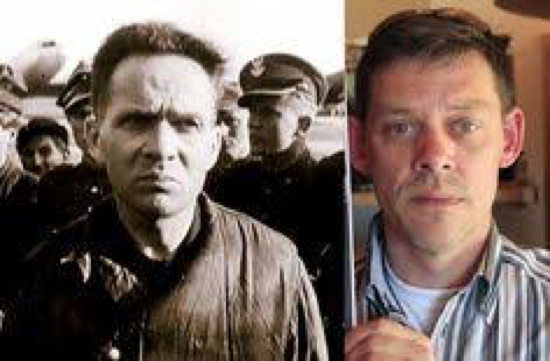
Hinterlasse einen Kommentar